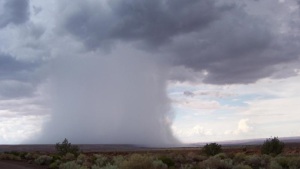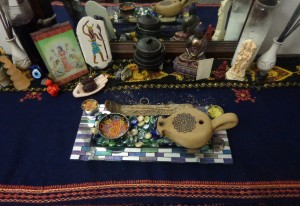 Last week’s topic at the Pagan Experience was on deity/the Divine and our experiences with Them/It. I was planning on writing a post about Ba’al, but every time I tried, only a jumbled mess came out. So I thought, maybe Ba’al didn’t want me writing anything about him after all. But then this week’s prompt is any topic that starts with the letter A or B. So, I’ll take that as a hint, and try this again.
Last week’s topic at the Pagan Experience was on deity/the Divine and our experiences with Them/It. I was planning on writing a post about Ba’al, but every time I tried, only a jumbled mess came out. So I thought, maybe Ba’al didn’t want me writing anything about him after all. But then this week’s prompt is any topic that starts with the letter A or B. So, I’ll take that as a hint, and try this again.
I want to take a moment to make it clear that I am not an expert on Canaanite religion or culture. I am only a follower of the Iluma, and a new follower at that.
Ba’al is the Hebrew word for lord. There were many gods in the ancient middle east called Ba’al so it isn’t wise to assume all Ba’al’s are the same god. But more often than not, when people are talking about Ba’al they are referring to one god in particular, Ba’al Hadad. Hadad translates to Thunderer, so his name literally means Lord Thunderer. And as his name suggests Ba’al is a storm god. In addition to being a storm god, Ba’al is also a warrior and a dying and rising god.
According to this website, Hadad originated from the Sumerian/Akkadian god Ishkur/Adad. In this form he was associated with both the benevolent and destructive aspects of storms. When he became the Ugaritic Hadad he took on a more benevolent nature, and became the protector and champion of humanity. He also moved up in rank and became one of the more important, if not the most important god in the pantheon.
Ba’al is the son of Dagon, the grain god, although sometimes he’s referred as the son of the chief god El. There’s a lot of confusion over this matter because mythology contradicts itself. Another point of confusion is whether Ba’al is married, and if so, to whom. Some have made the mistake of stating that Anat (the goddess of war) is his wife. Mythology mentions that Anat is a virgin. This doesn’t necessarily mean that she isn’t sexual (although there is no evidence that she is), but it does mean she’s not married. Sometimes sources will say that Astarte is Ba’al’s wife. Astarte plays a minor roll in Ugaritic mythology, and no where does it say that she is married to Ba’al. According the the Bible, Asherah and Hadad are an item. And the Assyrian Adad is married to Shala, a goddess of the grain, emotion and compassion. Confusing right? Sometimes a pagan just has to accept that pagan mythology isn’t like the scripture of book religions. Depending on the location the same god can have different myths, different family members and sometimes even a different personality.
In Ugarit Ba’al Hadad has three women, Tallay (dewy), Pidray (light), and Arsay (earthy). They are often seen as his daughters, and sometimes as his wives. I go with the daughter explanation because in the myth of the marriage of Yarihu (moon god) and Nikkal (orchard goddess), Nikkal’s father suggests that Yarihu marry one of Ba’al’s women. This suggestion wouldn’t make sense if these women were his wives. Ba’al also has two servants Gapnu (vine) and Ugar (field). Thunder is said to be Ba’al’s voice and I imagine that his two weapons Yagarish (Driver), and Ayamari (driver) represent lightening. One of Ba’al titles is the “Rider on the clouds.” I tend to see Ba’al as traveling with his daughters and servants in rock-star-esque type entourage when he brings rain to the earth. (My UPG, but it just seems right.)
When I first started exploring the Canaanite pantheon and had little interest in Ba’al Hadad. I think my Southern Baptist upbringing had a little to do with it. Conservative Christians tend to see the name Ba’al as either as one of Satan’s many names, or at least the name of a very powerful demon. Even after I learned more about Ba’al, I still wasn’t very interested. I’m not a warrior type person, and I’m generally not attracted to the warrior archetype.
So what am I doing with this god? I felt like he chose me. One cloudy monsoon day Ba’al just showed up, and from that moment on I’ve understood why the ancient Israelites had such a hard time not worshiping him. And the more I think about it, the more sense it makes. I love rain. When I was a child, my sister and I use to run outside and play in the rain. I’ve also spent a decent portion of my life living in arid or semi arid climates, where it’s not too uncommon to go weeks without any sort of precipitation. Living in the desert really makes you appreciate, adore, and respect rain.


